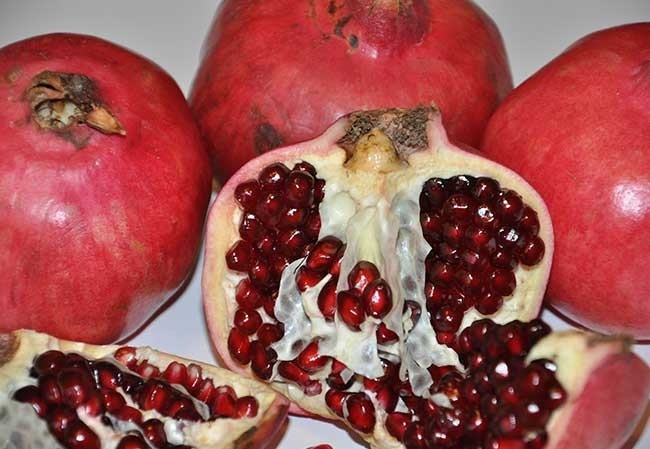Researchers from the Georg-Speyer-Haus in Frankfurt am Main, Germany, and Goethe University Frankfurt have succeeded in developing a new strategy for the treatment of colorectal cancer as part of an interdisciplinary initiative of the LOEWE Center Frankfurt Cancer Institute (FCI).
 A metabolite from pomegranates boosts tumor-fighting T cells, according to a study by Georg-Speyer-Haus, Goethe University Frankfurt and the LOEWE Center Frankfurt Cancer Institute (FCI). Image Credit: Markus Bernards
A metabolite from pomegranates boosts tumor-fighting T cells, according to a study by Georg-Speyer-Haus, Goethe University Frankfurt and the LOEWE Center Frankfurt Cancer Institute (FCI). Image Credit: Markus Bernards
They discovered that urolithin A, a metabolite produced from pomegranate, sustainably increases the performance of immune cells in their battle against cancer in preclinical models and investigations on human immune cells.
Following urolithin A treatment, tumor-fighting immune cells transform into T memory stem cells, which can divide to continuously replenish the immune system with new, non-exhausted T cells.
Advanced stages of colorectal cancer continue to have substantial death rates. Numerous scientific discoveries in recent years have enhanced early diagnosis and treatment, but sadly, not all patients react well to novel therapeutic modalities.
According to recent research, immunological dysfunction is one of the characteristics of tumor disorders. The tissue around the tumor, known as the tumor microenvironment, suppresses immune cells that should be fighting the tumor. T cells, the human body’s natural immune response to cancer, are therefore limited in their ability to operate, enabling the tumor to grow and spread unchecked.
The study team at the Institute for Tumor Biology and Experimental Therapy and Goethe University Frankfurt, under the direction of Professor Florian Greten, has now significantly advanced toward a potential resolution to the issue.
The researchers demonstrated that urolithin A triggers a biological pathway known as mitophagy, which renews and recycles mitochondria, the “powerhouse” of the cell in T cells.
The T cells eliminate their old, damaged mitochondria and replace them with fresh, healthy ones. The T cells’ genetic makeup is altered as a result, making them more equipped to battle the tumor.
The preclinical model in which urolithin A can be consumed as food inhibits tumor development and even works in concert with current immunotherapy, which is one way the researchers showed the therapeutic potential of urolithin A.
Nonetheless, human T cells also benefited from urolithin A therapy. Urolithin A “rejuvenates” human T cells in vitro, creating memory T memory stem cells in a lab setting.
Our findings are particularly exciting because the focus is not on the tumor cell but on the immune system, the natural defense against cancer. This is where reliable therapeutic approaches are still lacking in the reality of colorectal cancer patients.”
Dominic Denk, Study First Author and Physician, Frankfurt University Hospital
Denk added, “By possibly improving the combination therapy with existing immunotherapies, the study opens up meaningful possibilities for further application in the clinic. We hope to use this to sustainably improve the therapy of colorectal cancer, but also of other cancers.”
The use of urolithin A will be clinically examined in people with colorectal cancer in upcoming studies as the researchers build on their fruitful partnership.
This work proves once again how successful the interdisciplinary concepts of the FCI are. We are very pleased that we can now quickly transfer our results to the clinic and look forward with great excitement to the upcoming clinical trials.”
Florian Greten, Professor, Institute for Tumor Biology and Experimental Therapy
Source:
Journal reference:
Denk, D., et al. (2022). Expansion of T memory stem cells with superior anti-tumor immunity by Urolithin A-induced mitophagy. Immunity. doi.org/10.1016/j.immuni.2022.09.014